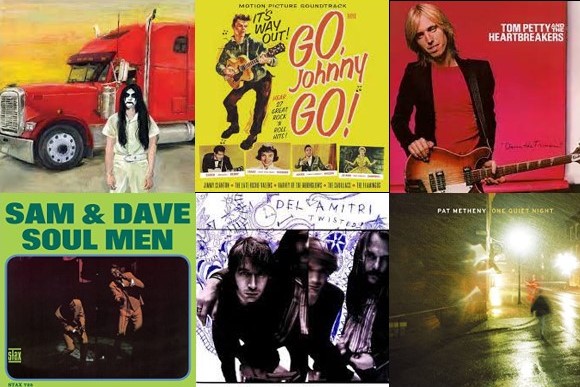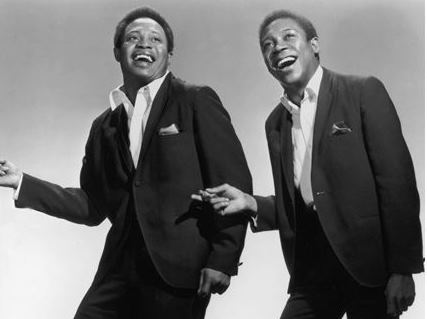Yep, hard to believe it’s Sunday again. While I find it amazing how another week just flew by, on the upside, this also means it’s time again for my favorite feature, The Sunday Six. For first-time visitors, these weekly posts are mini excursions exploring different styles of music in zig-zag fashion over the past 70 years, six tunes at a time.
My picks for this installment include instrumental acoustic guitar music, classic rock & roll, rock, soul and pop rock. The journey starts in 2021 and then makes stops in 1959, 1979, 1967 and 1995 before it comes to an end in 2003. All on board and fasten your seatbelts!
Hayden Pedigo/Letting Go
As is often the case in this series, I’d like to start with an instrumental track. This time, instead of a jazz tune, I’ve picked some lovely acoustic guitar music by Hayden Pedigo, a 27-year-old American artist whose music I first encountered about a month ago. According to Wikipedia, Pedigo started taking guitar lessons as a 12-year-old. His diverse influences include Stevie Ray Vaughan and Ry Cooder, as well as artists of the so-called American Primitive Guitar style, such as John Fahey, Robbie Basho, Daniel Bachman and Mark Fosson. Pedigo has also studied Soft Machine and King Crimson, and jazz artists like Miles Davis and Pharoah Sanders. In 2013, he released his debut album Seven Years Late. Since then, seven additional records have come out, including his latest, Letting Go, which appeared on September 24. Here’s the title track. I find this music very nice, especially for a Sunday morning.
Chuck Berry/Little Queenie
Just in case you dozed off during that previous track, it’s time to wake up again with some classic rock & roll by one of my favorite artists of the genre, Chuck Berry. I trust the man who John Lennon called “my hero, the creator of rock & roll” needs no further introduction. While of course no one single artist invented rock & roll, I think it’s safe to say rock & roll would have been different without Chuck Berry. Apart from writing widely covered gems like Maybellene, Roll Over Beethoven, Rock and Roll Music and Johnny B. Goode, Berry influenced many other artists like The Beatles, The Rolling Stones, The Beach Boys, Faces, The Yardbirds and The Kinks with his electric guitar licks. Here’s Little Queenie, which Berry wrote and first released as a single in March 1959. The tune also became part of the soundtrack of the rock & roll motion picture Go, Johnny Go that came out in June of the same year.
Tom Petty and the Heartbreakers/What Are You Doin’ in My Life?
Let’s keep rockin’ with a great tune by Tom Petty and the Heartbreakers: What Are You Doin’ in My Life? I have to credit my streaming music provider for including the track in a recent “Favorites Mix” playlist. While this song is on my favorite Tom Petty album Damn the Torpedoes from October 1979, it had not quite registered until it was served up to me recently. I think it’s fair to say Petty’s third studio album with the Heartbreakers is better known for tunes like Refugee, Here Comes My Girl, Even the Losers and Don’t Do Me Like That. What Are You Doin’ in My Life? is more of deep track. Like most of the other songs on the album, it was solely written by Petty.
Sam & Dave/Soul Man
Next I’d like to go back to the ’60s and some dynamite soul by Stax recording artists Sam & Dave. Soul Man, co-written by Isaac Hayes and David Porter, became the R&B duo’s biggest U.S. mainstream hit surging all the way to no. 2 on the Billboard Hot 100. The tune was first released as a single in September 1967 and was also included on Sam & Dave’s third studio album Soul Men that came out the following month. The backing music was provided by Stax’s excellent house band Booker T. & the M.G.’s. In fact, the exclamation in the song, “Play it, Steve,” refers to the band’s guitarist Steve Cropper. Sam & Dave performed as a duo between 1961 and 1981. Sadly, Dave Prater passed away in a single-car accident in April 1988 at the age of 50. Sam Moore is still alive and now 86.
Del Amitri/Roll to Me
I had not heard of Del Amitri in a long time until I did earlier this week on the radio. In fact, other than the name and that tune, Roll to Me, I know nothing about this Scottish alternative rock band that was formed in Glasgow in 1980. During their initial run until 2002, the group released six studio albums and two compilations. Since Del Amtri reemerged from hiatus in 2013, it looks like they have mainly been a touring act. Only one live record, one compilation and one studio album have since appeared. Notably, the latter, Fatal Mistakes, came out this May, 19 years after their last studio album. The band’s current line-up includes original member and main songwriter Justin Currie (vocals, guitar, piano), along with Iain Harvie (guitar), Kris Dollimore (guitar), Andy Alston (keyboards, percussion) and Ash Soan (drums). Roll to Me, written by Currie, is from the group’s fourth studio album Twisted from February 1995. It also was released separately as a single in June that year and became their biggest hit in the U.S. where it reached no. 10 on the Billboard Hot 100 – quite a catchy pop rock tune!
Pat Metheny/One Quiet Night
And this once again brings me to the sixth and final track. I decided to pick another acoustic guitar instrumental: One Quiet Night by Pat Metheny. While I’m very familiar with the name Pat Metheny, I believe the only music I had ever heard before is American Garage, the second album by Pat Metheny Group from 1979. That’s easily more than 30 years ago, so I don’t recall the record but oddly remember its title. Metheny who has been active since 1974 has an enormous catalog between Pat Metheny Group, his solo work and other projects. One Quiet Night, written by him, is the title track of a solo acoustic guitar album he released in May 2003. It won the 2004 Grammy Award for Best New Age Album. Both my streaming music provider and Wikipedia tagged it as jazz, the genre that first comes to my mind when I think of Metheny. Whatever you want to label it, it’s nice instrumental music and shall close this post.
Sources: Wikipedia; Discogs; YouTube





